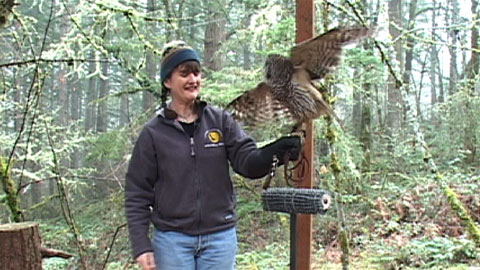Taking time to help injured raptorsMelissa Hart has been volunteering at the Cascades Raptor Center for six years. She's done everything from cleaning cages to glove-training owls.By Josh BolkanMelissa Hart walks down to the parking area from behind a shed packed with shovels, pet carriers and other miscellanea. She looks perfectly comfortable among the spongy wet moss, the dripping trees and the rain that’s falling just a bit too hard to be called mist. She’s wearing hiking boots, a dark gray fleece jacket, one black leather glove and a plastic box hanging from a belt that she cheerfully explains is full of bloody pieces of dead mice. Today, she seems perfectly comfortable at the three-and-a-half acre Cascades Raptor Center, though it wasn’t always that way. 
Melissa began volunteering at the Cascades Raptor Center six years ago, shortly after moving to Eugene. She can be found there five days a week, when she’s not working as an adjunct professor at the University of Oregon, teaching memoir writing through the University of California at Berkeley’s online extension program or working on one of her own books or articles. She says that she started volunteering to impress a man. She met Jonathan at the dog park and he suggested that she come down to the Raptor Center where he volunteered. So she did. In the beginning, Melissa was afraid of the sharp-taloned birds and put off by the raw pieces of quail, mice and chicks they ate. And volunteers aren’t allowed to handle them for at least a year anyway. So she cleaned a lot of droppings out of a lot of cages. “I’d be all filthy and I’d hear Jonathan’s truck pull up and I’d put on some lipstick and expect him to notice me,” she said. Eventually she got over her fear of the birds and came to appreciate them on their own terms, rather than the possibility of romance they represented. Recently, she’s been glove-training Bodhi, a juvenile barred owl, and Archimedes, a snowy owl like the one in the Harry Potter movies. A glove-trained bird flies to its perch when it sees it handler, then hops up on the glove when the handler approaches. Bodhi was blown out of his nest during a storm in Texas and broke two bones in his wing. The people who found him turned him over to a bird rehabilitator two weeks later, but his wing was already healing out of alignment. He was sent to the Raptor Center in May 2007. Since he can’t fly and hunt properly, Bodhi will spend his entire life at the center. Meet some of the people and birds at the Cascades Raptor Center.Archimedes was hatched in a captive breeding program in 2000, and then sent to a similar program in Pennsylvania in 2006. A mate was never found for him, so he was sent to live at the Raptor Center in February 2006. Snowy owls are notoriously hard to train for a few reasons. First, they’re not the smartest of birds. Their eyes go far back into their heads, which doesn’t leave much room for a brain. Second, they’re from a much colder climate, so they get overheated in the winter, which makes it difficult for them to work very long. Finally, snowy owls nest on the ground. As a result, when they try to fly off the glove, they head for the ground and often end up upside down. That’s called bating, and it’s a fairly stressful experience for the birds. In the fall of 2007, Melissa submitted a humorous essay about her experiences training Archimedes to the International Association of Avian Trainers and Educators in Amsterdam. Although Melissa is quick to point out that she is not a scientist, she is very excited to be attending the conference in early March, in part. Archimedes, unfortunately, will have to stay at the center because snowy owls don’t travel well. Jonathan, however, will be traveling with her. Melissa would probably still be willing to wade through bird droppings to impress Jonathan, but it wouldn’t be very gentlemanly of a man to ask such a thing of his wife. Story and video by Joshua Bolkan. |
